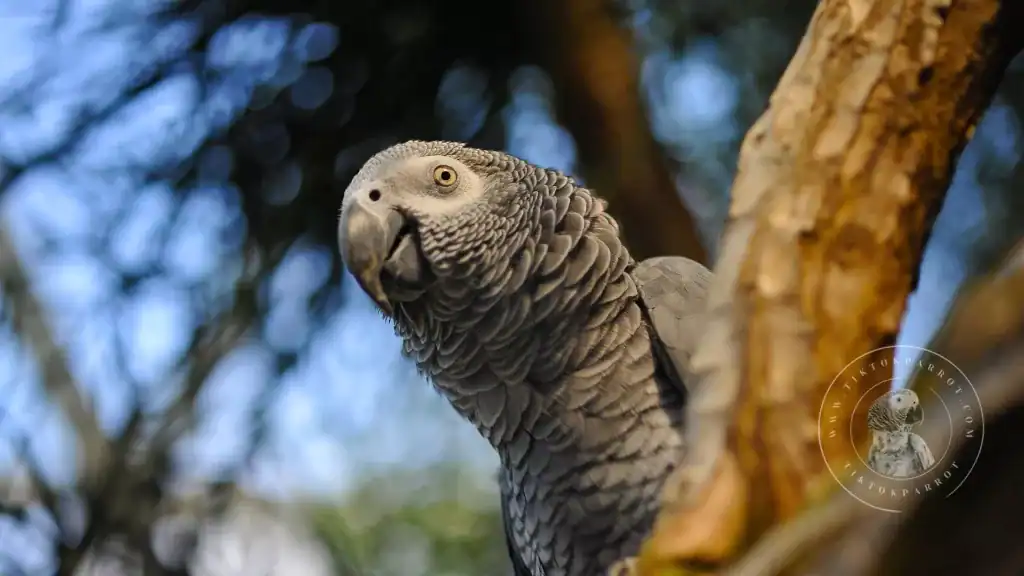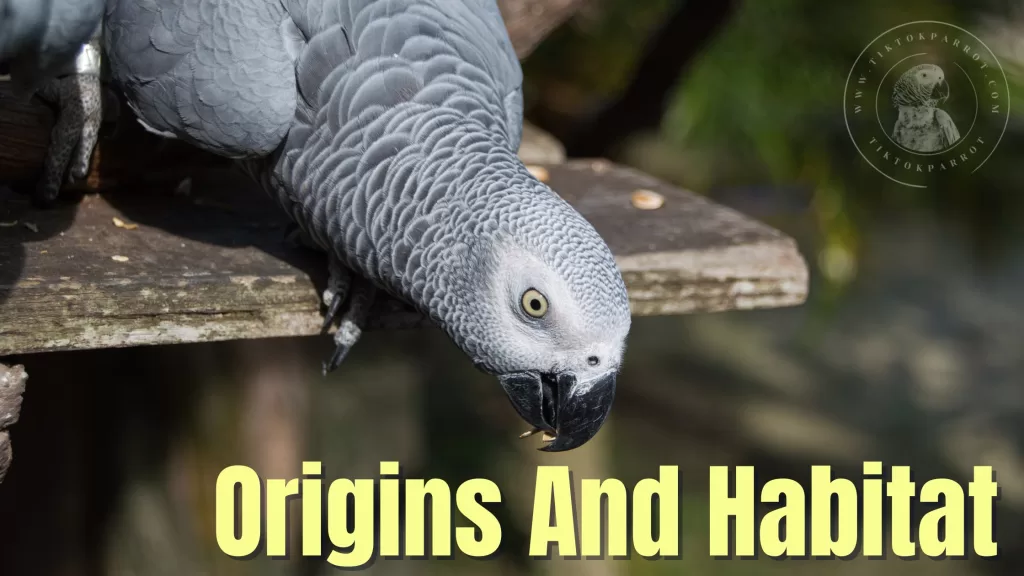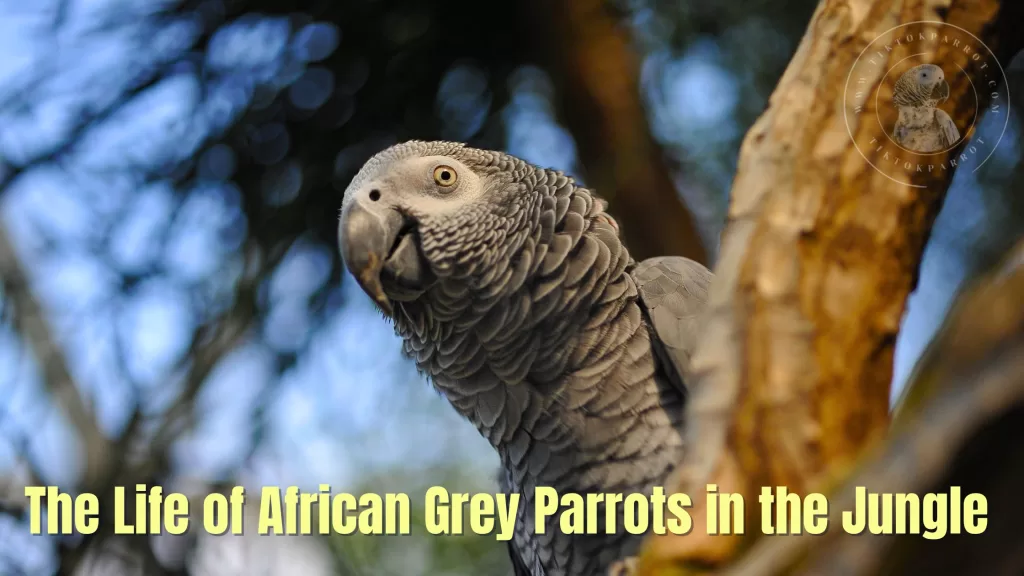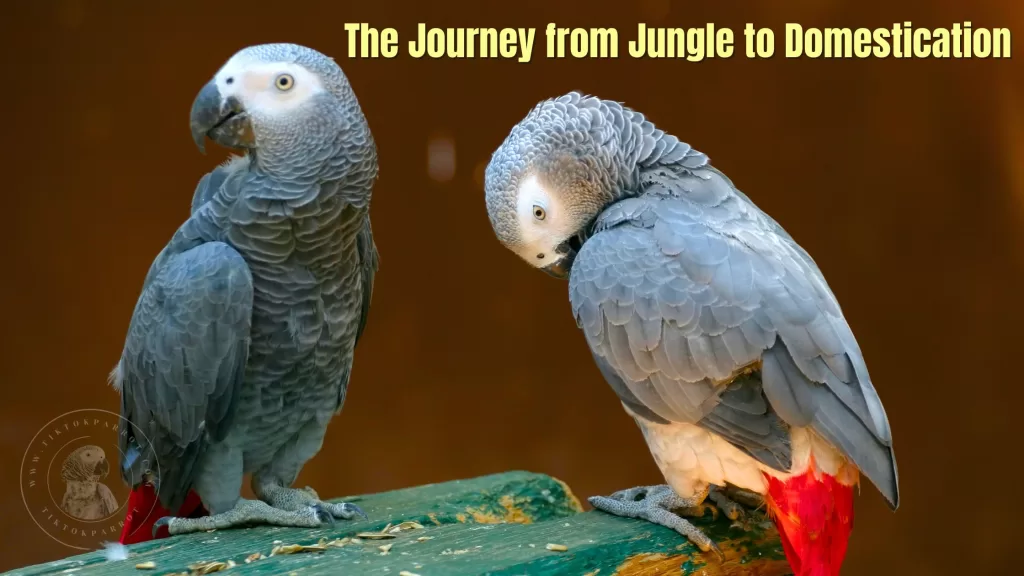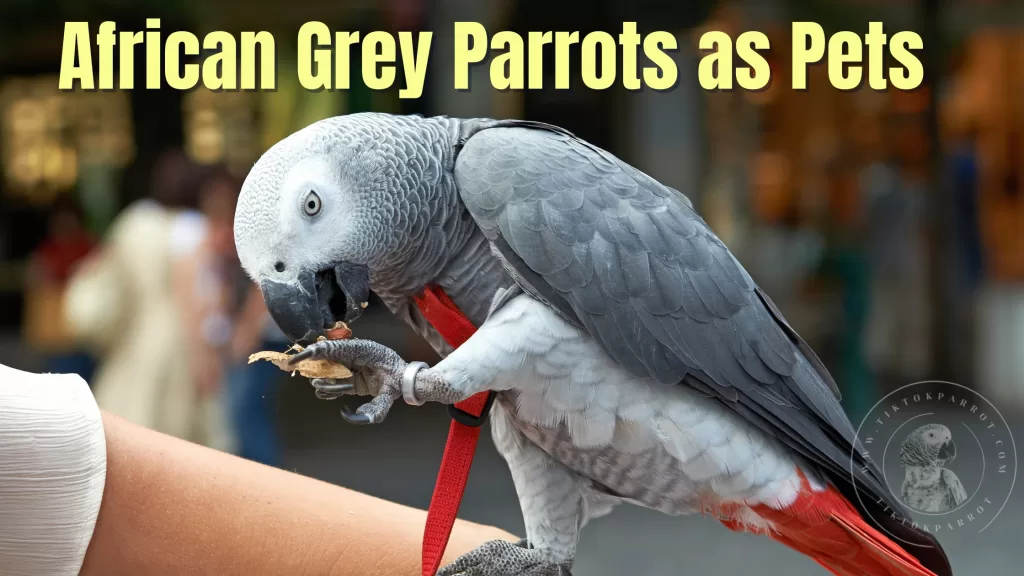Welcome to an exciting exploration of the captivating journey of African grey parrots from the jungle to our homes. These intelligent and charismatic birds have long been sought after as pets due to their exceptional talking abilities and charming personalities.
Discover the captivating journey of African Grey Parrots, from the jungle to your home. Explore their remarkable adaptations, the challenges they face in the wild, and how they transition to becoming beloved companions. Learn about conservation efforts and responsible ownership. From Jungle to Home: The Fascinating Journey of African Grey Parrots awaits!
In this article, we will delve into their origins, their incredible adaptations to the jungle environment, the challenges they face in the wild, and their transition to becoming beloved companions in our homes. Join us as we embark on a fascinating journey with the African grey parrots!
Origins and Habitat
The African Grey parrot, also known as Psittacus erithacus, is one of the most intelligent bird species. Renowned for their advanced problem-solving skills and uncanny ability to mimic human speech, these parrots have found a special place in the hearts of bird lovers worldwide.
They inhabit a range of countries including Ivory Coast, Ghana, Nigeria, Cameroon, and the Democratic Republic of Congo. These lush and vibrant jungles provide the perfect natural environment for the parrots to thrive.
Natural Habitat of African Grey Parrots
Native to the dense rainforests of Central and West Africa, African greys thrive in a habitat rich in fruits, nuts, and palm trees. Their natural environment plays a pivotal role in shaping their behavior and dietary preferences, which we will delve into next.
The Life of African Grey Parrots in the Jungle
Challenges in the Wild
While African grey parrots have successfully adapted to the jungle, they face numerous challenges in their natural habitat. These challenges have contributed to their declining numbers in the wild.
Habitat Loss and Deforestation
One of the most significant threats to African grey parrots is habitat loss due to deforestation. The rapid expansion of agriculture, logging, and urbanization has resulted in the destruction of vast areas of their natural habitat. As their homes disappear, the parrots face difficulties finding suitable nesting sites and accessing their primary food sources.
Illegal Wildlife Trade
The African grey parrots’ exceptional talking abilities and charismatic personalities have made them highly sought after as pets. Unfortunately, this demand has fueled illegal wildlife trade, leading to widespread poaching and smuggling of these birds. The capture and transportation processes are often cruel and result in high mortality rates, further endangering their population in the wild.
Diet and Hunting Habits
In the wild, African greys feed predominantly on fruits, nuts, and seeds, exhibiting an interesting foraging behavior. They tend to feed in large flocks, enhancing their survival chances against potential predators.
Climate Change and Disease
Climate change poses a significant threat to African greys and the entire jungle ecosystem. The alteration of rainfall patterns and rising temperatures can disrupt the delicate balance of the rainforest, affecting the availability of food and nesting sites for the parrots. Additionally, changing climatic conditions can increase the spread of diseases, further endangering the already vulnerable population.
Biodiversity in the Jungle
The African greys share their habitat with a plethora of other unique and diverse species. From vibrant toucans to agile monkeys, the jungle is teeming with life. This rich biodiversity creates a balanced ecosystem where each organism plays a vital role.
The Role of African Grey Parrots
African grey parrots are important contributors to the jungle ecosystem. Their feeding habits involve cracking open nuts and fruits, allowing them to disperse seeds across vast distances. This behavior aids in the regeneration of the forest and helps maintain its biodiversity.
Jungle Adaptations
The African grey parrots have evolved remarkable adaptations to survive in the challenging jungle environment. These intelligent birds have evolved specialized features to navigate and survive in their complex environment.
One notable adaptation is their exceptional vocal mimicry abilities, allowing them to imitate a wide range of sounds, from other bird calls to human speech. This skill helps them communicate with their flock and blend into the diverse soundscape of the jungle.
Their powerful beaks are adapted for cracking open nuts and seeds, which form a significant part of their diet. Additionally, their grey plumage with red tail feathers serves as effective camouflage, enabling them to blend in with the shadows and foliage of the dense rainforest canopy.
This natural camouflage helps protect them from potential predators, providing a crucial advantage for their survival. The African grey parrots’ adaptations showcase their remarkable ability to adapt and thrive in the challenging and diverse jungle environment.
The Journey from Jungle to Domestication
While the wild remains the natural habitat for African greys, they have also found their way into our homes as beloved companions. Let’s explore the journey of these charismatic birds from the jungle to our living rooms.
The Historical Context
The journey from jungle to home has been a long one for African Greys. The Romans and Greeks documented these parrots as pets over 2000 years ago, and the trade has continued unabated since.
Process of Capturing and Transportation
The capturing process, unfortunately, is often fraught with danger and trauma for the parrots. They are then transported under stressful conditions, with many not surviving the journey.
Captive Breeding Programs
Captive breeding programs play a significant role in the availability of African grey parrots as pets. These programs aim to breed the parrots in controlled environments, ensuring their welfare and minimizing the demand for wild-caught individuals. Ethical breeders prioritize the well-being of the birds, providing proper nutrition, enrichment, and socialization opportunities.
Adoption and Responsible Ownership
Adopting an African grey parrot from a reputable rescue or adoption center is a responsible choice. These centers often house parrots that have been relinquished by their previous owners or rescued from illegal trade. Providing a forever home to these birds not only prevents further demand for wild-caught individuals but also offers a second chance for a happy and fulfilling life.
Commitment to Proper Care
Owning an African grey requires a lifelong commitment to their well-being. These intelligent and social birds thrive in environments where they receive proper care, stimulation, and social interaction. Adequate housing, a balanced diet, regular veterinary care, and mental enrichment are essential for their physical and emotional health.
African Grey Parrots as Pets
Suitability as Domestic Pets
Despite the hardships they face during capture and transport, African Greys have a unique ability to adapt to domestic life. Their intelligent and sociable nature makes them beloved pets, offering companionship unlike any other.
Social Behavior and Communication
African Greys are highly social creatures, living in flocks and exhibiting intricate communication through a complex system of vocalizations. Remarkably, they even exhibit a form of empathy, a trait thought to be unique to humans.
Care and Maintenance
Care for an African grey parrot involves providing a suitable environment, balanced diet, and ample mental stimulation. They require consistent social interaction to stay healthy and happy.
Intelligent Problem Solvers
African greys are renowned for their exceptional intelligence. They possess the ability to solve complex problems, recognize shapes, and even demonstrate numerical skills. These cognitive abilities are believed to have evolved as a result of the challenges they face in the jungle, where resourcefulness is crucial for survival.
Specialized Beaks for Nut Cracking
One of the most remarkable adaptations of African grey parrots is their powerful beaks. These beaks are specifically designed for cracking open hard nuts found abundantly in the jungle. Their impressive strength allows them to access the nutrient-rich contents inside, providing them with sustenance in their natural habitat.
Exceptional Mimicry and Vocalization
African greys are renowned for their exceptional ability to mimic sounds and human speech. Their vocalizations not only serve as a means of communication but also play a crucial role in their survival. In the dense jungle, these parrots utilize their vocal talents to identify other members of their flock, locate food sources, and alert their peers about potential dangers.
The Controversy Surrounding Pet Trade
Legal and Ethical Concerns
The trade of African Greys has been marred by legal and ethical controversies. While it’s illegal to capture wild parrots in most countries, illegal trade persists, fueled by high demand.
Conservation Efforts
Several conservation groups are working tirelessly to protect African grey parrots. Efforts include rehabilitating rescued parrots, cracking down on illegal pet trade, and educating the public about the ethical implications of owning these exotic birds.
My Final Thoughts
The journey of the African grey parrots from the jungles of Africa to our homes is indeed fascinating, marked by resilience, intelligence, and a remarkable ability to adapt. However, it’s crucial that we respect these beautiful creatures and ensure their well-being, both in their natural habitat and our homes. After all, the survival and welfare of these incredible birds are a shared responsibility.
FAQs
1. Why are African Grey Parrots so popular as pets?
African grey parrots are popular because of their intelligence and ability to mimic human speech. They are sociable and can form strong bonds with their human caregivers.
2. What are the biggest threats to African Grey Parrots in the wild?
Habitat loss due to deforestation and the illegal pet trade are the biggest threats to African greys in the wild.
3. How can we help conserve African Grey Parrots?
Supporting conservation efforts, adopting instead of buying, and spreading awareness about the issues surrounding the pet trade can all contribute to the conservation of African grey parrots.
4. What is the lifespan of an African Grey Parrot?
With proper care, African greys can live up to 60 years in captivity or even up to 80 years if well looked after. In the wild, their lifespan is typically shorter due to threats from predators and disease.
5. What do African Grey Parrots eat?
In the wild, they primarily eat fruits, nuts, and seeds. In captivity, their diet should be varied and balanced, including fresh fruits, vegetables, and specially formulated parrot pellets.
6. How often should African Grey Parrots be fed?
African grey parrots should be fed twice a day, once in the morning and once in the evening. Always ensure they have access to clean, fresh water.
7. How much sleep do African Grey Parrots need?
African grey parrots need about 12-14 hours of sleep per day, ideally in a quiet, dark place without disturbances.
8. Can African Grey Parrots fly in the wild?
Yes, African greys are excellent flyers in the wild and can travel long distances in search of food.
9. How can I tell the age of an African Grey Parrot?
Determining the exact age of an African grey parrot can be challenging. However, young birds usually have darker eyes which lighten with age.
10. Are African Grey Parrots endangered?
Yes, African grey parrots are classified as “Endangered” on the IUCN Red List due to extensive habitat loss and illegal trapping for the pet trade.
11. What is the natural habitat of African Grey Parrots?
African greys are native to the dense rainforests of Central and West Africa, where they live in large flocks.
12. Do African Grey Parrots need a companion?
African grey parrots are social birds and they do thrive when they have a companion. However, if you provide enough interaction, they can also do well on their own.
13. Can African Grey Parrots learn tricks?
Yes, due to their high intelligence, African greys can learn a variety of tricks and commands, and they’re known for their impressive ability to mimic human speech.
14. What are the signs of a healthy African Grey Parrot?
A healthy African grey parrot will have clear, bright eyes, a clean beak, smooth feathers, and a strong, steady grip. They should also be alert and active.
15. Can African Grey Parrots recognize themselves in a mirror?
Research suggests that African grey parrots possess self-recognition skills, which is a rare trait in the animal kingdom, further indicating their high level of intelligence.
16. Are African Grey Parrots monogamous?
Yes, African greys are typically monogamous and mate for life. They form strong bonds with their partners.
17. How many eggs does an African Grey Parrot lay?
An African grey parrot typically lays 3-5 eggs in a clutch, with each egg being laid a few days apart.
18. What temperature is ideal for African Grey Parrots?
African greys prefer temperatures between 65-85°F (18-29°C). They can tolerate slight variations but sudden changes or extreme temperatures can be harmful.
19. How can I tell the sex of an African Grey Parrot?
It’s hard to determine the sex of an African grey parrot visually, as both sexes have similar appearances. DNA testing or surgical sexing are the most reliable methods.
20. Can African Grey Parrots understand human language?
While African grey parrots can mimic human speech remarkably well, it’s still a subject of research to what extent they truly understand the language they mimic. They do, however, seem to associate words with their meanings in some instances.
If you found this blog helpful, It would be great if you could share it with your family and friends who might find it useful as well.
For more useful content about African grey parrots, you can subscribe my site with your email to get notification upon publishing a new blog, the subscribe box you can see on the right side of this page. Also if you get an alert on your web browser while browsing my site, allow it and that will also give you an alert whenever I publish a new blog. 🙂
You might like to read these as well.
Are African Grey Parrots Right For You?
The Joys and Challenges of Adopting an African Grey Parrot
Adopting Instead of Buying a Pet (Check out Top 7 reasons to adopt a pet)
Is Your Child Ready for an African Grey Parrot? Find Out the Perfect Age Now!
Surprising facts about African Grey Parrots
Tips for Buying an African Grey Parrot
African Grey Parrot Price & Owning Cost
Understanding Your African Grey Parrot Nature and Type
How to Rear a Young African Grey Parrot
African Grey Parrots as Pets, The Pros and Cons of Owning One
Stay safe and much love !



